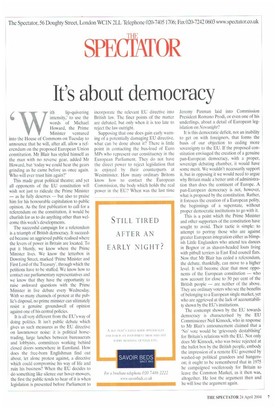It's about democracy
w intensity,' to use the words of Michael Howard, the Prime Minister ventured into the House of Commons on Tuesday to announce that he will, after all, allow a referendum on the proposed European Union constitution. Mr Blair has styled himself as the man with no reverse gear. added Mr Howard, but 'today we could hear the gears grinding as he came before us once again. Who will ever trust him again?'
This made great political theatre; and yet all opponents of the EU constitution will wish not just to ridicule the Prime Minister — as he fully deserves — but also to praise him for his honourable capitulation to public opinion. As the first publication to call for a referendum on the constitution, it would be churlish for us to do anything other than welcome this week's developments.
The successful campaign for a referendum is a triumph of British democracy. It succeeded because an aggrieved public realised where the levers of power in Britain are located. To put it bluntly, we know where the Prime Minister lives. We know the letterbox in Downing Street, marked 'Prime Minister and First Lord of the Treasuni. through which the petitions have to be stuffed. We know how to contact our parliamentaty representatives and we know that they have the opportunity to raise awkward questions with the Prime Minister in live debate every Wednesday. With so many channels of protest at the public's disposal, no prime minister can ultimately resist a genuine groundswell of opinion against one of his central policies.
It is all very different from the EU's way of doing politics. It isn't public debate which gives us such measures as the EU directive on lawnmower noise: it is political horsetrading, large lunches between bureaucrats and lobbyists, committees working behind closed doors somewhere in Euroland. How does the free-born Englishman find out about, let alone protest against, a directive which could compromise his way of life and ruin his business? When the EU decides to do something like silence our hover-mowers, the first the public tends to hear of it is when legislation is presented before Parliament to incorporate the relevant EL; directive into British law. The finer points of the matter are debated, but only when it is too late to reject the law outright.
Supposing that one does gain early warning of a potentially damaging EU directive, what can be done about it? There is little point in contacting the bus-load of Euro MPs who represent our constituency in the European Parliament. They do not have the direct power to reject legislation that is enjoyed by their counterparts at Westminster. How many ordinary Britons know how to contact the European Commission, the body which holds the real power in the EU? When was the last time
Jeremy Paxman laid into Commission President Romano Prodi, or even one of his underlings, about a detail of European legislation on Newsnight?
It is this democratic deficit, not an inability to get on with foreigners, that forms the basis of our objection to ceding more sovereignty to the EU. If the proposed constitution envisaged the creation of a genuine pan-European democracy, with a proper, sovereign debating chamber, it would have some merit. We wouldn't necessarily support it, but in opposing it we would need to argue why Britain made a better unit of administration than does the continent of Europe. A pan-European democracy is not, however, what is proposed by the constitution. Rather, it foresees the creation of a European polity, the beginnings of a superstate, without proper democratic institutions to go with it.
This is a point which the Prime Minister and other supporters of the constitution have sought to avoid. Their tactic is simple: to attempt to portray those who are against greater European integration either as blimpish Little Englanders who attend tea dances in Bognor or as shaven-headed louts living with pitbull terriers in East End council fiats. Now that Mr Blair has ceded a referendum, the debate, thankfully, can move to a higher level. It will become clear that most opponents of the European constitution — who now account for close to 50 per cent of the British people — are neither of the above. They are ordinary voters who see the benefits of belonging to a European single market, yet who are aggrieved at the lack of accountability shown by the EU's institutions.
The contempt shown by the EU towards democracy is characterised by the EU Commissioner Neil Kinnock, who in response to Mr Blair's announcement claimed that a 'No' vote would be 'grievously destablising' for Britain's relations with the EU. Not only does Mr Kinnock, who was twice rejected at the ballot box by the British people, embody the impression of a remote EU governed by washed-up political grandees and hangerson; it ought to be remembered that in 1975 he campaigned vociferously for Britain to leave the Common Market, as it then was, altogether. He lost the argument then and he will lose the argument again.


















































































 Previous page
Previous page